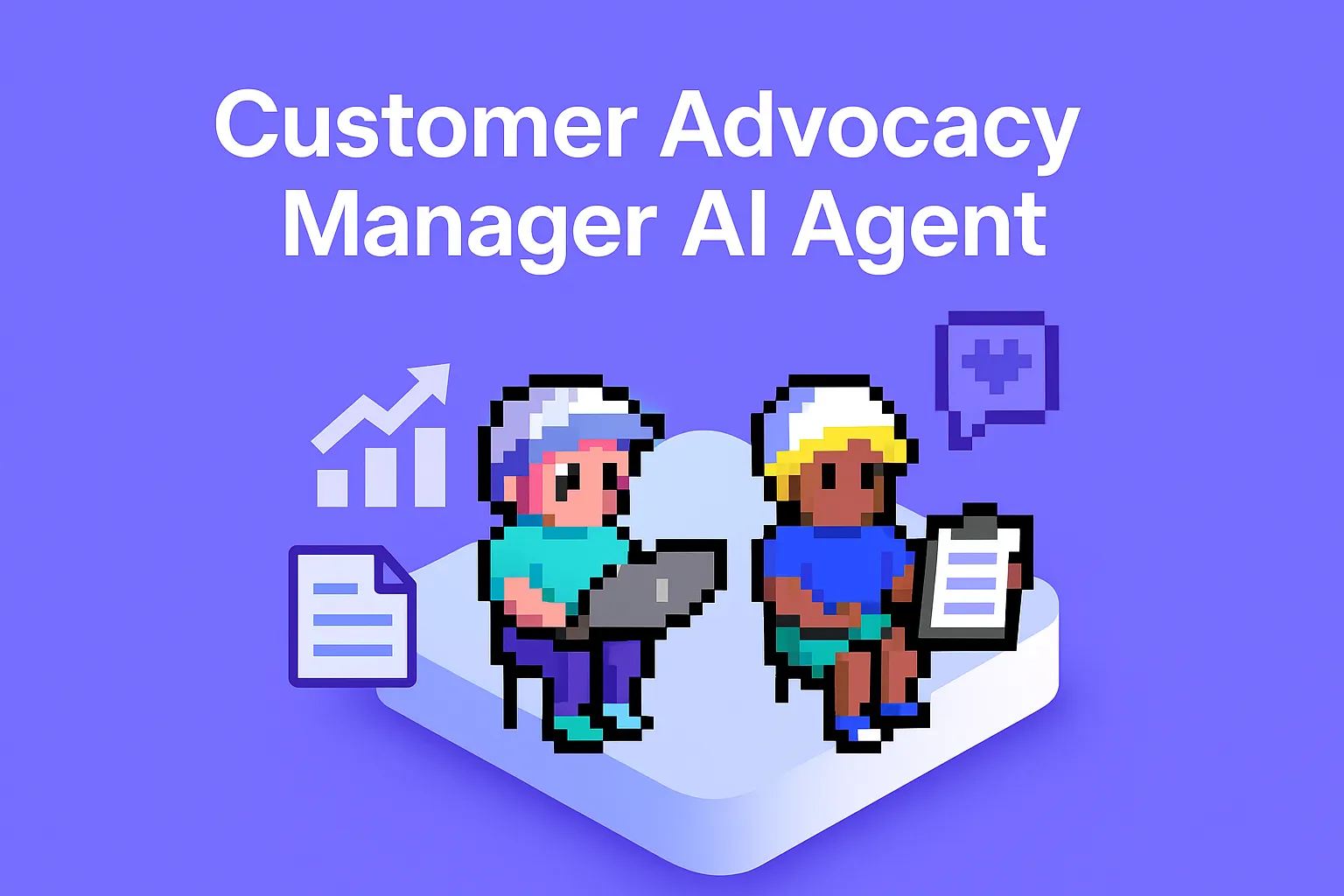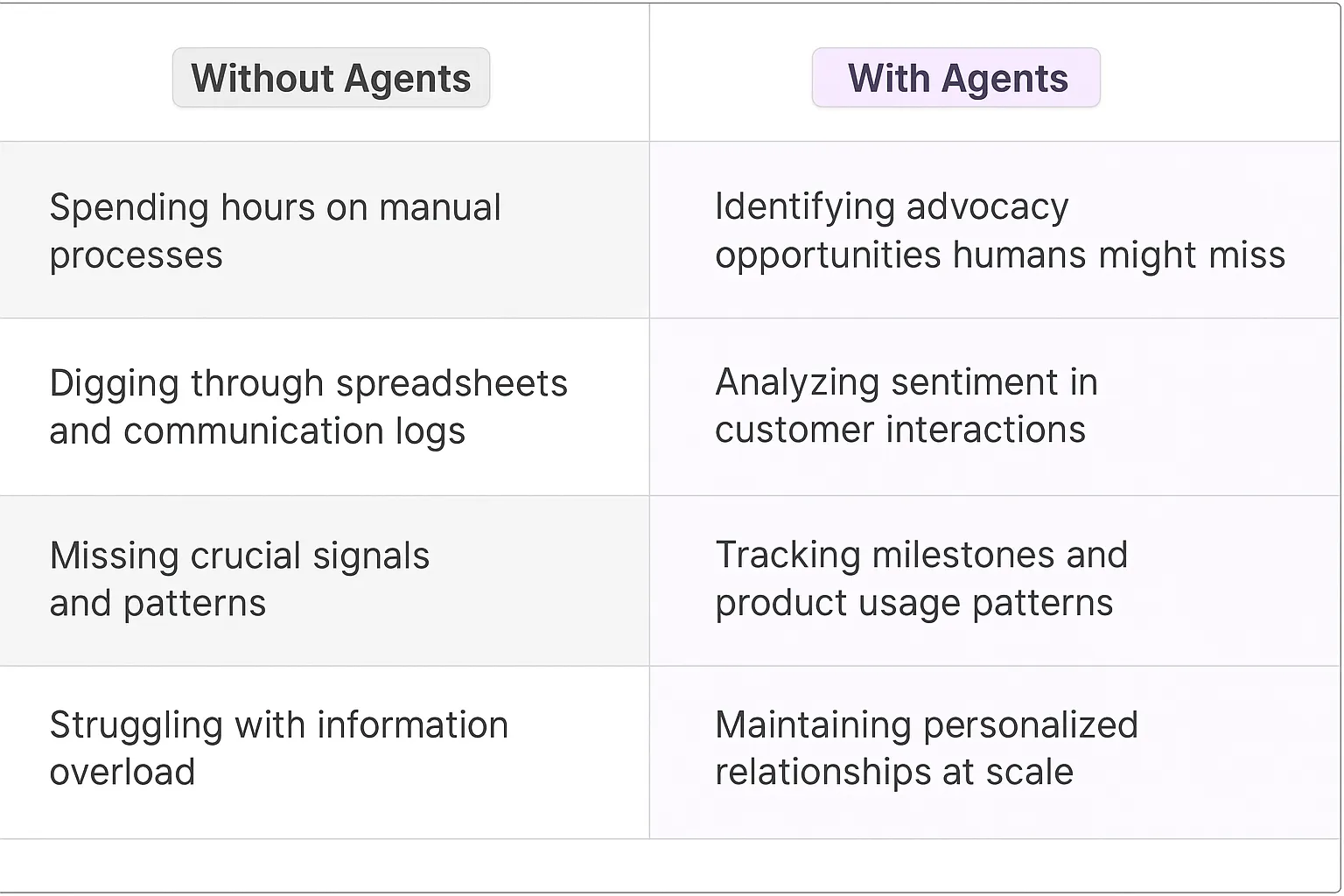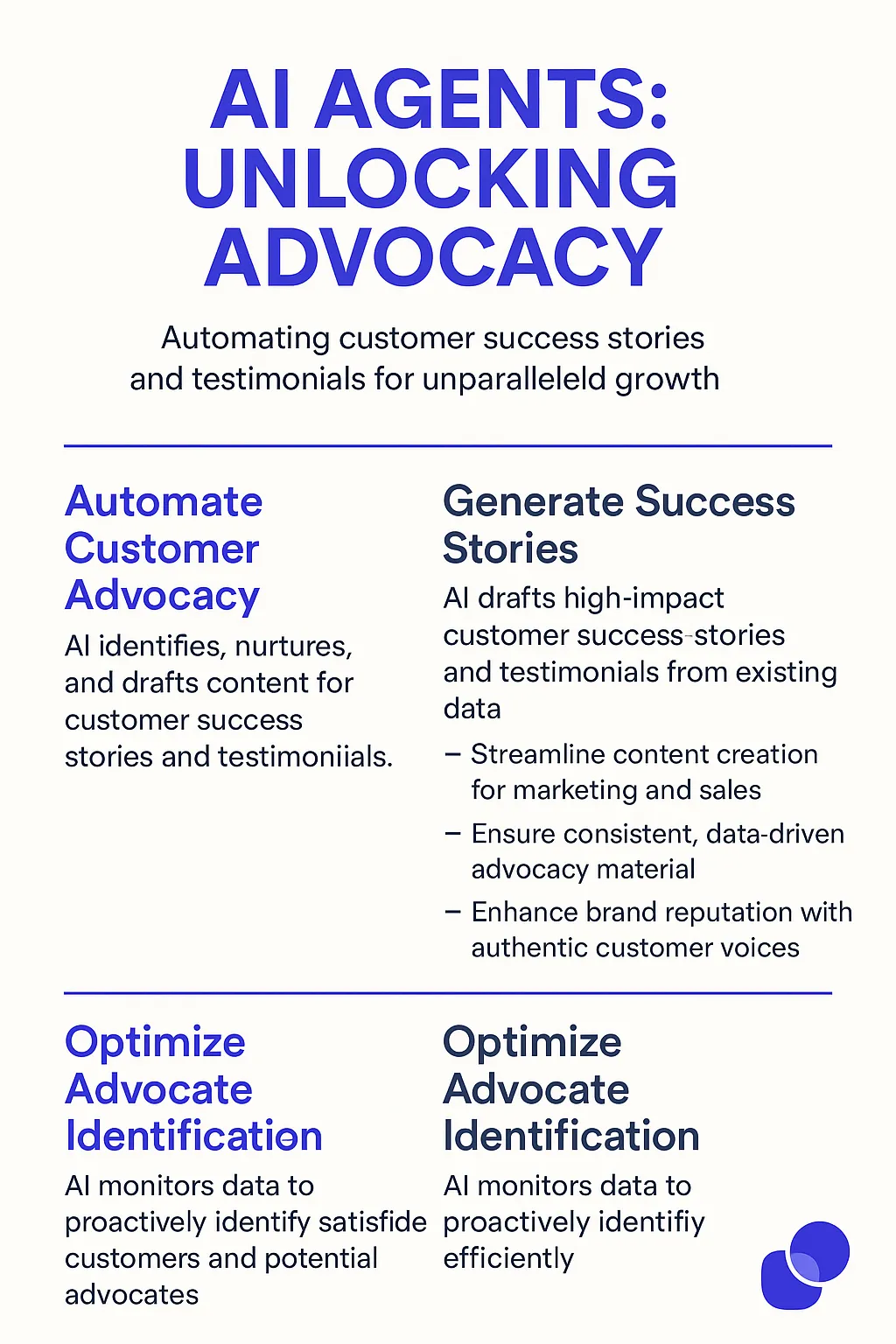A Customer Advocacy Manager AI Agent is a sophisticated digital teammate that works alongside human advocacy professionals to scale customer relationships and program impact. It analyzes customer interactions across multiple channels, identifies advocacy opportunities, and manages the operational aspects of advocacy programs. Unlike basic automation tools, these AI agents learn from each interaction, developing a nuanced understanding of customer behavior patterns and advocacy potential.

Customer advocacy teams traditionally operated through a complex web of manual processes. They'd spend hours digging through spreadsheets, juggling multiple communication channels, and maintaining detailed customer interaction logs. The typical workflow involved customer success managers manually tracking feedback, scheduling check-ins, and trying to identify patterns in customer behavior - often missing crucial signals due to information overload.
Teams relied heavily on basic CRM systems, shared docs, and endless email threads to piece together customer stories. This fragmented approach meant valuable insights often got lost in translation, and advocacy opportunities slipped through the cracks.
The integration of AI agents into customer advocacy creates a fundamental shift in how teams operate. These digital teammates excel at pattern recognition across vast amounts of customer data, identifying advocacy opportunities that humans might miss. They can analyze sentiment in customer communications, flag potential advocates, and proactively suggest engagement strategies.
A key advantage is their ability to maintain consistent, personalized relationships with hundreds of customers simultaneously. They track customer milestones, product usage patterns, and social media engagement, creating a comprehensive view of each customer's journey. This deep understanding helps identify the perfect moment to transform satisfied customers into vocal advocates.
The real game-changer is how AI agents augment human relationship-building skills. While human advocacy managers focus on strategic conversations and building emotional connections, AI agents handle the heavy lifting of data analysis, content curation, and program tracking. This partnership approach leads to more authentic advocacy relationships and higher program ROI.
For metrics-driven teams, AI agents provide unprecedented visibility into advocacy program performance. They can track the ripple effects of advocacy activities, measure sentiment changes over time, and quantify the business impact of customer stories - all while continuously learning and improving their recommendations.

Customer advocacy programs often suffer from manual bottlenecks that limit their scalability. Digital teammates can remove these friction points, creating a powerful flywheel effect. When advocacy managers deploy AI agents effectively, they can focus on high-value relationship building while automation handles the operational heavy lifting.
The most successful customer advocacy programs I've studied share a common thread: they excel at turning customer enthusiasm into tangible assets. AI agents accelerate this process by capturing and categorizing customer wins in real-time, making it easier to spot patterns and amplify success stories.
What's particularly fascinating is how AI agents can identify advocacy opportunities before they're obvious to human teams. By analyzing customer interaction patterns, product usage data, and social signals, these digital teammates surface potential advocates who might have otherwise gone unnoticed.
The key to successful implementation lies in starting with narrow, well-defined use cases. Begin with tasks that are both time-consuming and repeatable, such as drafting initial success story outlines or managing reference request workflows. As the system learns from interactions, gradually expand its responsibilities to more complex tasks like identifying potential customer advocates based on engagement patterns.
Remember that the goal isn't to replace human relationship building, but to amplify it. The most effective customer advocacy programs use AI agents to handle operational tasks while human teams focus on deepening customer relationships and strategic planning.

Customer advocacy managers face intense pressure to scale personalized support while maintaining authentic human connections. AI agents are transforming how advocacy teams operate across different business environments. The real power comes from AI's ability to handle complex customer scenarios while preserving the human touch that defines great advocacy work.
Looking at specific industries, we're seeing fascinating applications emerge. SaaS companies deploy AI agents to analyze customer feedback patterns and proactively surface insights to advocacy managers before issues escalate. E-commerce brands use them to track customer sentiment across hundreds of touchpoints, helping advocacy teams prioritize high-impact interactions. B2B firms leverage AI to build comprehensive customer health scores that combine quantitative and qualitative signals.
What makes these use cases compelling isn't just the efficiency gains - it's how AI amplifies the human elements of customer advocacy. By handling routine analysis and data synthesis, AI agents give advocacy managers more bandwidth to focus on relationship building and strategic initiatives that truly move the needle for customers.
The SaaS industry faces a unique challenge - customer advocacy programs often hit a ceiling because success managers can only maintain meaningful relationships with a limited number of customers. I've seen this pattern repeat across hundreds of startups: the advocacy program starts strong but struggles to scale beyond the initial cohort of enthusiastic early adopters.
A Customer Advocacy Manager AI Agent transforms this dynamic by maintaining ongoing conversations with thousands of customers simultaneously. For a mid-market SaaS company, the agent proactively identifies advocacy opportunities by analyzing product usage patterns, support interactions, and social media engagement.
When a customer successfully implements a complex feature or achieves a significant ROI milestone, the agent automatically reaches out to capture their story. It conducts in-depth interviews, drafts compelling case studies, and maintains a database of customer wins that the sales and marketing teams can leverage.
The most fascinating aspect is how the agent builds authentic relationships over time. It remembers previous conversations, understands each customer's unique journey, and personalizes outreach based on their communication style and preferences. One enterprise software company saw their customer advocacy participation rate increase from 12% to 47% within six months of deploying the agent.
Beyond case studies, the agent coordinates customer speaking opportunities, manages reference calls, and even identifies potential candidates for customer advisory boards. It's not just about collecting testimonials - it's about nurturing a thriving community of brand advocates who actively contribute to the product's evolution.
The network effects here are powerful: as more customers engage with the advocacy program, the agent becomes increasingly skilled at matching advocates with opportunities that align with their interests and expertise. This creates a flywheel effect that continuously strengthens the customer community.
I've been tracking a fascinating trend in e-commerce where the traditional approach to customer advocacy is getting completely flipped on its head. The old playbook of manually hunting for positive reviews and hoping customers will spread the word just doesn't cut it anymore, especially when you're dealing with thousands of SKUs and millions of transactions.
A major beauty brand recently showed me how they deployed a Customer Advocacy Manager AI Agent across their entire product line. The results were mind-blowing. Instead of their small community team struggling to keep up with advocacy opportunities, the agent now monitors post-purchase behavior patterns, social media mentions, and repeat purchase data to identify potential brand champions.
What's particularly clever is how the agent segments advocates based on their specific product expertise and passion areas. When a customer consistently purchases from the clean beauty line and engages with sustainability content, the agent automatically enrolls them in relevant micro-communities and connects them with other eco-conscious customers.
The metrics tell an interesting story: the brand saw a 312% increase in user-generated content within four months. But it's not just about quantity - the quality of advocacy improved dramatically. The agent analyzes thousands of customer interactions to understand which storytelling angles resonate most authentically with different audience segments.
One unexpected benefit emerged around product development. The agent identified patterns in advocate feedback that led to three successful product launches. By maintaining ongoing dialogues with passionate customers, it surfaced subtle usage patterns and unmet needs that traditional market research missed.
The most compelling aspect is how the agent builds authentic advocacy loops. When a customer shares detailed product feedback, the agent follows up weeks later to share how their input influenced product decisions. This creates a powerful sense of ownership and deepens brand loyalty in ways that traditional loyalty programs never could.
The growth implications are significant - we're seeing customer acquisition costs drop by 40-60% in categories where strong advocacy communities exist. The future of e-commerce belongs to brands that can scale authentic customer relationships through intelligent automation while maintaining that crucial human touch.
Building a Customer Advocacy Manager AI agent requires careful navigation of several technical complexities. The agent needs to process vast amounts of customer interaction data across multiple touchpoints - from social media mentions to support tickets and product feedback. One significant challenge lies in creating accurate sentiment analysis models that can distinguish between subtle customer emotions and intentions, especially in B2B contexts where feedback tends to be more nuanced.
Customer advocacy data often contains sensitive information about both customers and internal operations. Organizations must implement robust encryption protocols and access controls while ensuring the AI agent can still effectively analyze and act on the data. GDPR and CCPA compliance becomes particularly tricky when the agent needs to track customer interactions across borders.
The introduction of an AI-powered advocacy manager often faces resistance from existing customer success teams. Many professionals worry about job displacement or loss of personal relationships with customers. Success requires a clear communication strategy that positions the AI agent as a tool for enhancing human capabilities rather than replacing them.
Traditional customer advocacy metrics like Net Promoter Score (NPS) and Customer Satisfaction (CSAT) may not fully capture the impact of an AI agent. Organizations need to develop new frameworks that measure both quantitative improvements (response times, issue resolution rates) and qualitative factors (relationship depth, advocacy quality). Performance Measurement becomes crucial for understanding the true value of AI-enhanced advocacy programs.
Finding the right balance between automated and human interactions presents an ongoing challenge. While AI can handle routine advocacy tasks efficiently, customers still value authentic human connections. Organizations must carefully design interaction flows that maintain personalization while leveraging AI's scalability advantages.
Customer advocacy patterns evolve constantly, requiring regular updates to the AI's training data and response mechanisms. Organizations need dedicated resources for monitoring agent performance, updating training datasets, and fine-tuning algorithms to maintain effectiveness over time.
The adoption of AI Agents in customer advocacy represents a fundamental shift in how organizations build and scale their advocacy programs. By combining AI's analytical capabilities with human relationship skills, companies can create more impactful advocacy programs that drive genuine business growth. The most successful implementations will be those that use AI to amplify human connections rather than replace them. As these technologies evolve, we'll likely see even more sophisticated applications that further transform how organizations build and maintain customer advocacy programs.